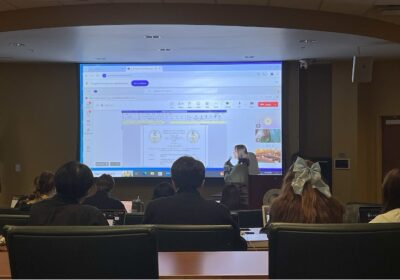Changes to SG’s New Hope resolution work to bring together both sides of the aisle

The New Hope resolution, originally named the Hands Off resolution, faced changes on the SG Senate floor Tuesday night to bring together pro-Palestinian senators and the Jewish organization Hillel.
ORACLE PHOTO/CHAVELI GUZMAN
Collaboration and compromise finally seemed to prevail in Student Government Senate on Tuesday night with the introduction of a rebranded resolution that addresses President Donald Trump’s decision to name Jerusalem Israel’s political capital.
The New Hope resolution, previously named the Hands Off resolution, passed overwhelmingly with a vote of 39-3.
This resolution’s intent was changed after much debate and compromise between pro-Palestinian senators and Hillel, a Jewish organization on campus.
“We wanted to take into account the constituents on both sides of the aisle,” Sen. Yousef Afifi said. “As a result, we wanted to go back to the drawing boards, see what input they had to offer. At the end, in the wee hours of the night, we managed to come together and put together almost a finalized draft.”
Previously, the intent stated condemnation for Trump’s decision due to “the atrocities that the State of Israel has committed against Palestinian people.”
The updated intent states the resolution “is to recognize the suffering of the Palestinian people” while also expressing the desire to promote peace on the behalf of students.
“A lot of it (the resolution) is still pro-Palestinian and still calls to attention the sufferings of the Palestinian people,” Afifi said. “The difference from this and other resolutions is they're talking about condemnation, condemnation, condemnation. This actually calls for a resolution to the conflict itself in that it's calling for both sides to come together and actually coexist.”
However, Sen. Andrew Pitts-Nordera vehemently spoke out against what he said were personal attacks waged against Senate President Amani Taha because of this resolution.
“I would just like to say that the Senate president (Amani Taha) was attacked personally, because of the work on this resolution,” Pitts-Nordera said. “She had no part in writing this resolution, she can't even vote on this resolution.
“So, I would like to ask, ‘why was she attacked?’ But I who wrote it, who was the vice president of SJP (Students for Justice in Palestine), I who is a member of SJP, was not attacked by these same individuals. I can guarantee you that answer is because I'm white and that is my privilege.”
Ed Rosenthal, the executive director of Hillel and campus rabbi, helped SG create the resolution that aimed to better address the concerns of Jewish students.
“I think the students went to great extremes to improve the atmosphere on our campus,” Rosenthal said. “I was very pleased that they acknowledge Israel’s right to exist and call the governments to come together to make peace. I was very pleased with what the students did.”
The compromise reached did not originate easily, according to a Sen. Murzia Siddiqui.
“Today we want to take a step forward in the right direction,” Siddiqui said. “We want to take both sides together and we just want to move forward. It's difficult. I compare it to Democrats and Republicans coming to an agreement on health care.”
After a very contentious week within SG, senators are looking toward the future.
“Forget about the divide,” Siddiqui said. “Forget about what everyone is saying about SG. This is what we embody.”






